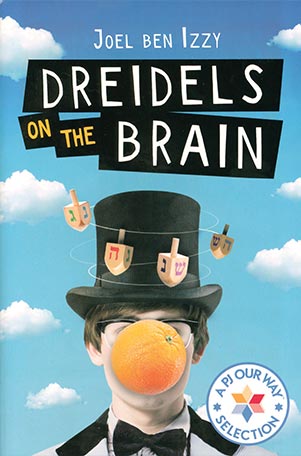Dreidels on the Brain
Average Rating
As the only Jewish kid at Bixby school, with a family that’s downright mortifying and flat broke, it’s no wonder that twelve-year-old Joel fantasizes about becoming a superhero – Normalman – that kid who looks like everyone else.
Joel’s life is full of challenges: his father suffers from Ankylosing Spondylitis and is disabled, and his mom has a host of medical issues as well. Money is a constant struggle, and if that’s not bad enough, Joel is short, wears thick glasses, and has braces. Luckily, he’s a talented magician and gets through life using his own particularly Jewish brand of self-deprecating humor. This story is set in the 1970s and is full of cultural and Jewish references from that period.
In this poignant and funny coming-of-age story, Joel learns to appreciate the good things in life and manage the difficulties too.
- Joel and his family celebrate Hanukkah by lighting the menorah, singing songs, telling the story of the Maccabees, eating latkes, and, especially, playing dreidel.
- There are many references to Jewish traditions, Yiddish humor, and Jewish celebrities throughout the story.
- Joel attends bar mitzvah class and converses with God regularly.
- Joel meets and is inspired by a Holocaust survivor, who shares his story.
- Joel is a kind son and comes across as more mature, thoughtful, and responsible than the average twelve-year-old. When his father gets bad news about his latest business venture, he tips over the chess game they were playing so he wouldn’t win the game and risk hurting his father’s feelings. At the beginning of the book he is ashamed to bring his unusual family to the school concert, but he eventually learns to embrace his life’s weirdness and walk with pride.
- Joel’s parents are optimistic characters who care deeply for their children and try to provide them with everything they need.
Joel meets a Holocaust survivor on a bus, and hears the man’s sad but inspiring story, which includes being starving, cold, and tattooed with a number. The kids discuss the Holocaust between themselves and share details about piles of eyeglasses and teeth from victims, and showers that spray poison gas.
As the only Jewish kid at Bixby school, with a family that’s downright mortifying and flat broke, it’s no wonder that twelve-year-old Joel fantasizes about becoming a superhero – Normalman – that kid who looks like everyone else.
Joel’s life is full of challenges: his father suffers from Ankylosing Spondylitis and is disabled, and his mom has a host of medical issues as well. Money is a constant struggle, and if that’s not bad enough, Joel is short, wears thick glasses, and has braces. Luckily, he’s a talented magician and gets through life using his own particularly Jewish brand of self-deprecating humor. This story is set in the 1970s and is full of cultural and Jewish references from that period.
In this poignant and funny coming-of-age story, Joel learns to appreciate the good things in life and manage the difficulties too.
- Joel and his family celebrate Hanukkah by lighting the menorah, singing songs, telling the story of the Maccabees, eating latkes, and, especially, playing dreidel.
- There are many references to Jewish traditions, Yiddish humor, and Jewish celebrities throughout the story.
- Joel attends bar mitzvah class and converses with God regularly.
- Joel meets and is inspired by a Holocaust survivor, who shares his story.
- Joel is a kind son and comes across as more mature, thoughtful, and responsible than the average twelve-year-old. When his father gets bad news about his latest business venture, he tips over the chess game they were playing so he wouldn’t win the game and risk hurting his father’s feelings. At the beginning of the book he is ashamed to bring his unusual family to the school concert, but he eventually learns to embrace his life’s weirdness and walk with pride.
- Joel’s parents are optimistic characters who care deeply for their children and try to provide them with everything they need.
Joel meets a Holocaust survivor on a bus, and hears the man’s sad but inspiring story, which includes being starving, cold, and tattooed with a number. The kids discuss the Holocaust between themselves and share details about piles of eyeglasses and teeth from victims, and showers that spray poison gas.

